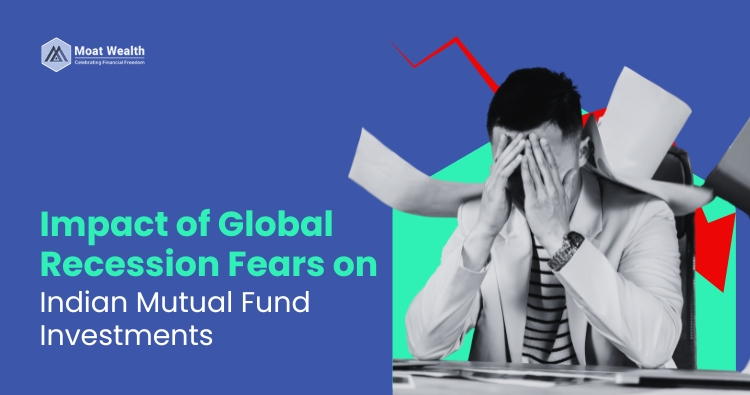The world economy in 2025 feels like a pressure cooker—geopolitical tensions, inflation, and unpredictable monetary policies are keeping investors on edge. With Donald Trump’s return to the U.S. presidency, protectionist policies like tariffs and trade restrictions have fueled concerns about a looming global recession.
For Indian investors, especially those with exposure to mutual funds, understanding how global uncertainty trickles down to our markets is key to making informed investment decisions. In this article, we’ll explore whether an economic downturn is really on the horizon, how it could impact Indian mutual funds, and what investors can do to protect and grow their portfolios.
Is a Global Recession Really Coming?
The fear of a global recession isn’t just media hype—it’s backed by real economic indicators:
- Slowing U.S. Growth: The American economy is showing signs of strain, with slower GDP growth, rising unemployment, and tighter monetary policies. Trump’s trade restrictions on China and Europe have also disrupted global supply chains.
- Persistent Inflation: Inflation in major economies like the U.S. and Europe remains stubbornly high, forcing central banks to maintain high interest rates, which, in turn, dampens business growth and investment.
- China’s Economic Slowdown: A weak real estate sector, high youth unemployment, and sluggish post-pandemic recovery have made China an economic wildcard, adding to global instability.
While some experts argue that strong labor markets in developed economies might prevent a full-blown recession, warning signs are everywhere. For Indian investors, the key question is: How will this impact our mutual fund investments?
How a Global Recession Could Affect Indian Markets
India may have a strong domestic economy, but it’s not immune to global shocks. Here’s how a downturn could ripple through the Indian stock market and mutual fund investments:
1. Foreign Portfolio Investment (FPI) Outflows
- During uncertain times, foreign investors tend to pull money out of emerging markets like India and move it to “safer” assets such as U.S. Treasuries.
- In 2025 alone, FPIs have already offloaded billions from Indian equities due to recession fears. A continued sell-off could lead to market volatility.
2. Impact on Export-Driven Sectors
- Sectors like IT, pharmaceuticals, and auto manufacturing that rely heavily on exports could see slower growth as demand from the U.S. and Europe weakens.
- Mutual funds heavily invested in these industries may experience short-term volatility.
3. Currency Fluctuations & Inflation
- A strong U.S. dollar and weakening rupee could make imports (such as crude oil) more expensive, leading to inflationary pressures in India.
- Rising inflation often prompts RBI to raise interest rates, which can impact businesses and, in turn, the stock market.
4. Domestic Growth as a Silver Lining
- Unlike many global economies, India’s strong domestic consumption could act as a cushion. Sectors like FMCG, banking, and infrastructure may continue to grow despite external slowdowns.
What Happens to Indian Mutual Fund Portfolios?
Different types of mutual funds will react differently to recession fears:
1. Equity Funds
- Mutual funds with high exposure to IT, pharma, or export-oriented stocks could face short-term pressure.
- However, funds focused on domestic consumption (FMCG, banking, infrastructure) might hold up well or even outperform.
2. Debt Funds
- Global economic stress usually leads to lower interest rates in the long run, which benefits long-duration debt funds.
- In the short term, however, rising interest rates may cause bond values to fall, impacting debt fund returns.
3. International Funds
- Mutual funds with exposure to U.S. or Chinese markets might underperform if those economies slow down.
- However, long-term investors in global funds can use this period as a buying opportunity when valuations are low.
4. Hybrid & Balanced Funds
- These funds dynamically adjust between equities and debt, making them relatively stable options during market volatility.
- Investors looking for lower risk should consider balanced advantage funds.
What Should Indian Investors Do?
At Moat Wealth, we believe that uncertainty should be met with strategy, not fear. Here’s how Indian investors can safeguard their mutual fund portfolios:
Diversify Smartly – Allocate across equities, debt, gold, and real estate.
Invest in Quality Stocks & Mutual Funds – Large-cap funds with strong financials are more stable.
Look at Defensive Sectors – FMCG, healthcare, and utilities are less affected by recessions.
Consider Fixed-Income Investments – Short-term debt funds and government securities can provide stability.
Stick to Your SIPs – Continue investing through market dips to benefit from cost averaging.
Maintain Liquidity – Keep cash or liquid funds ready for market corrections.
Seek Professional Guidance – Moat Wealth offers tailored investment strategies based on your risk profile.
FAQs: Indian Mutual Funds & Global Recession Fears
1. Should I stop my SIPs if a global recession happens?
No, stopping SIPs during a downturn is a mistake. SIPs allow you to buy more units at lower prices, helping you maximize returns when the market recovers. Market corrections are temporary, but long-term investments grow over time.
2. Which sectors perform well during a global recession?
Defensive sectors like FMCG, healthcare, and utilities tend to remain stable during recessions. Mutual funds with exposure to these industries can provide resilience in volatile times.
3. How do foreign investors impact the Indian stock market?
Foreign Portfolio Investors (FPIs) hold a significant share in Indian equities. When they pull out funds due to global uncertainty, it can lead to stock market volatility. However, long-term investors should focus on India’s strong domestic growth.
4. Are debt mutual funds safe during a recession?
Debt funds can offer stability, but their performance depends on interest rate movements. Short-term debt funds and government securities are usually safer during uncertain times compared to long-duration bonds.
5. Should I invest in gold if a global recession happens?
Gold is considered a safe-haven asset during economic downturns. Adding gold ETFs or sovereign gold bonds to your portfolio can help diversify risk.
6. How does Moat Wealth help investors during uncertain times?
At Moat Wealth, we provide personalized investment strategies to help investors navigate market volatility. Whether you’re looking to rebalance your portfolio, invest in defensive assets, or continue with your SIPs, our experts can guide you with data-driven insights.
Final Thoughts
Global recession fears are real, and their impact on Indian markets and mutual fund investments cannot be ignored. However, instead of reacting emotionally, investors must take a strategic, long-term view.
By diversifying portfolios, focusing on quality investments, continuing SIPs, and seeking professional advice, Indian investors can not only survive but also find opportunities in these turbulent times.
At Moat Wealth, we’re committed to guiding you through market uncertainties with data-backed insights and personalized strategies. Whether you’re an aggressive investor looking for long-term opportunities or a conservative investor seeking stability, we’ll help you make the right financial moves.
🔹 Need expert advice? Connect with Moat Wealth today and let’s build a resilient investment portfolio together!






